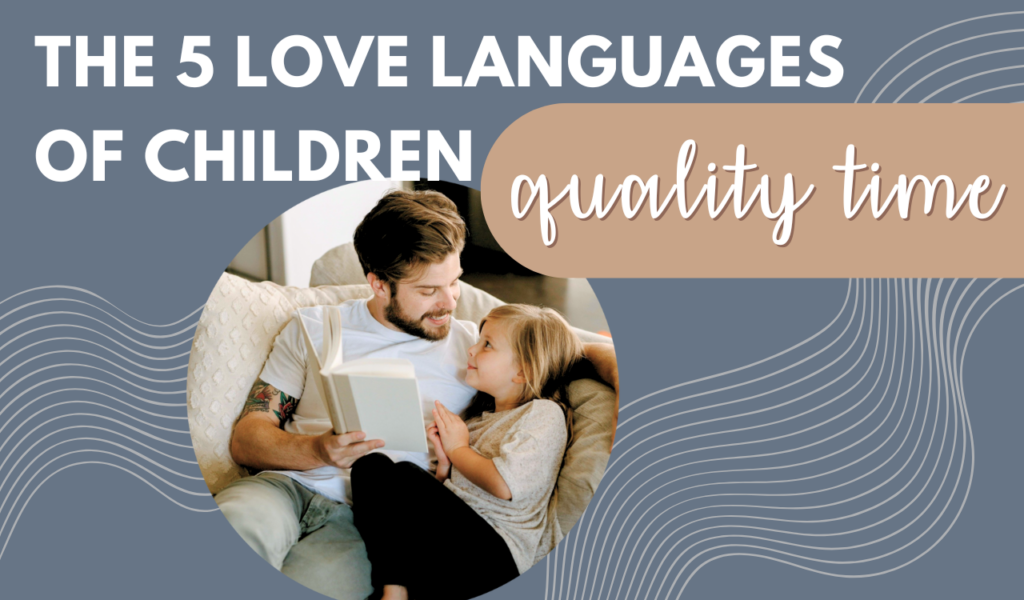
Does Your Child Feel Loved in the Way You Express Love?
Every child longs to feel loved, but did you know that the way they receive love might be completely different from the way you naturally express it?
For some children, gifts mean the world. Others feel loved through hugs, words of encouragement, or acts of service. But for a child whose primary love language is Quality Time, nothing matters more than your undivided attention.
To them, love is spelled T-I-M-E.
They don’t just want to be around you—they want to experience connection with you. And when that need goes unmet, they feel unseen, disconnected, or even unimportant.
So how do you know if your child’s love language is Quality Time? And what happens when they don’t get enough of it? Let’s dive in.
Signs Your Child’s Love Language is Quality Time
Children who crave Quality Time often show it in subtle (or not-so-subtle) ways. If your child:
✅ Constantly asks, “Will you play with me?” or “Can we do something together?”
✅ Gets upset when you seem distracted during time together
✅ Prefers shared experiences over receiving gifts or words of praise
✅ Acts out when they feel disconnected or like they’re not getting enough attention
…they might be asking for more than just your presence. They’re asking for your engagement.
But what happens when they don’t get it?
Why Quality Time Matters for a Child’s Emotional Security
For children who thrive on Quality Time, your attention = their sense of love and security.
💡 Think of it like this: Have you ever had a conversation with someone who was half-listening? Maybe they nodded and said “Mhm,” but their eyes were on their phone, or their thoughts were somewhere else.
Even though they were physically present, you could tell they weren’t emotionally present.
For a Quality Time child, this feeling of disconnection happens when a parent is with them, but not really with them.
What Happens When a Quality Time Child Feels Ignored?
When a child whose love language is Quality Time doesn’t receive it consistently, they may:
🚩 Seek attention in disruptive ways—because negative attention is still attention.
🚩 Withdraw emotionally—believing they aren’t as important as other things.
🚩 Struggle with self-worth—feeling invisible or unimportant in their closest relationships.
And here’s the hardest part:
A child who doesn’t receive Quality Time learns to stop asking for it.
They adapt. They assume connection isn’t available. And over time, they stop seeking it altogether.
But there’s good news—this can be changed.
What Your Child Secretly Wishes You Knew About Quality Time
A child who craves Quality Time isn’t asking for hours of your day. They’re asking for moments of real connection—where they feel seen, heard, and valued.
💭 They don’t need elaborate plans. They just need to know:
• That when they speak, you’re really listening.
• That when they reach for you, you won’t pull away.
• That when they invite you into their world, you’ll step in—fully present.
Even small shifts in how you give time can make a massive difference in their sense of security.
Want to know what those small shifts are? That’s exactly what we cover inside The C.A.L.M. Parent Academy
Your Next Step Toward Deeper Connection
Understanding your child’s love language is just the beginning.
If you want practical tools to create lasting connection, interrupt parenting patterns, and build a relationship where your child feels truly seen, The C.A.L.M. Parent Academy is here to support you.
Inside, you’ll learn:
✔ How to deeply understand your child’s unique needs (so they don’t have to act out for attention)
✔ How to create connection in everyday moments (without needing extra hours in your day)
✔ How to become the calm, present parent you want to be—even when life is overwhelming
💛 Join thousands of parents inside The C.A.L.M. Parent Academy and start building unshakable connection today.
💡 Final Thoughts: Are You Raising a Quality Time Child?
How often does your child ask you to play, watch, or do something together?
How do they react when they feel like they aren’t getting enough of your attention?
The signs are there—once you know what to look for.
What’s one way your child shows they need more Quality Time?
👉 Want more insights on raising emotionally connected kids? Join my weekly parenting newsletter for deeper guidance and real-life strategies.
